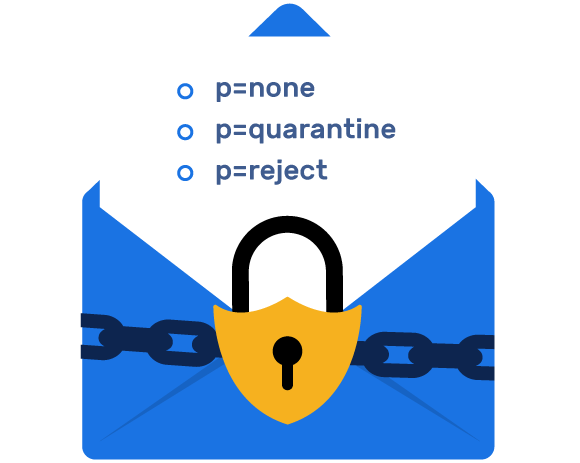p=none policy provides zero enforcement and allows unauthorized emails that fail verification to land in the receiver’s inbox without any hindrance.
Achieving DMARC Enforcement
What is DMARC Enforcement?
Researchers unveil that most companies stop at the DMARC implementation stage and don’t really proceed to enforcement. This can prove to be a huge blunder!
Enforcement is a very crucial part of DMARC, as solely implementing DMARC in your organization is not enough to configure and mitigate fraudulent emails. A key function of DMARC is that it provides domain owners with the ability to enforce a DMARC policy of how they would like receivers to handle emails and messages that fail DMARC authentication.
DMARC enforcement at an organization allows the domain owner to specify how they want to handle an email that fails authentication, unlike SPF and DKIM. If we assign DMARC policy with the “p” parameter, domain owners are presented with three options for configuring unauthorized emails:
By setting your DMARC policy to either quarantine or reject, you can enable DMARC Enforcement at your organization.
p=none is essentially considered to be a monitor mode or test mode, providing no enforcement, but instead enabling domain owners to troubleshoot authentication settings evading the risk of authorized emails from getting blocked.
Importance of DMARC Enforcement
With the help of DMARC enforcement, domain owners can direct receivers to put illegitimate and unauthenticated emails into the spam folder or completely reject them into the trash bin. If DMARC enforcement is not implemented effectively in an organization, domain owners will receive reports on the malicious IPs trying to spoof their domain, but they would have to helplessly witness domain abusers and impersonators continue to wreak havoc, without the ability to stop them.
A DMARC record without enforcement is as useless as a security guard who checks visitor IDs but lets everyone in regardless of whether or not they are legitimate.
Why is DMARC Enforcement Imperative to Businesses?
If your ultimate objective is to keep direct domain spoofing, email phishing, and impersonation attacks at bay, DMARC enforcement is as imperative as it is indispensable for your business! With your DMARC policy set to quarantine or reject you would be able to witness the benefits of DMARC enforcement at your organization, which are:
Standard Email Protocols: SMTP, POP3 & IMAP Free4 m
What is Email Security? Free4 m
Email Security Practices Free4 m
Building an Email Security Compliance Model Free5 m
Corporate Email Security Checklist Free3 m 30 s
What is the difference between Inbound email security and outbound email security? Free4 m
What is Information Security? Free4 m
Zero Trust Security Model Free3 m
What is SPF Alignment? Free3 m
How to Set Up Microsoft Office 365 SPF record? Free4 m
How to Set Up Google Workspace SPF Record? Free2 m
How to Set Up MailChimp SPF Record? Free3 m
How to Set Up SendGrid SPF Record? Free2 m
How to Set Up Salesforce SPF Record? Free3 m
How to Setup Zoho Mail SPF Record? Free2 m
What is DMARC Compliance? Free2 m
The Benefits of DMARC Free2 m
DMARC Configuring Free3 m
Achieving DMARC Enforcement Free2 m
DMARC Vs Antispam Solutions Free2 m
DMARC Identifier Alignment Free2 m
DMARC sp Tag Exceptions & Uses Free1 m
Configuring DMARC without DKIM Free3 m
Configuring DMARC without SPF Free2 m
DMARC Aggregate Report Views Free3 m
Video - PowerDMARC Aggregate Reports Free2 m 13 s
DMARC Forensic Report Views Free2 m
Video - PowerDMARC Forensic Reports Free
DMARC Forensic PGP Encryption and Decryption Free2 m
TLS Report Views Free3 m
Video - PowerDMARC TLS Reports Free
PDF/CSV Reports Free2 m
Video - PowerDMARC PDF/CSV Reports Free1 m 1 s
